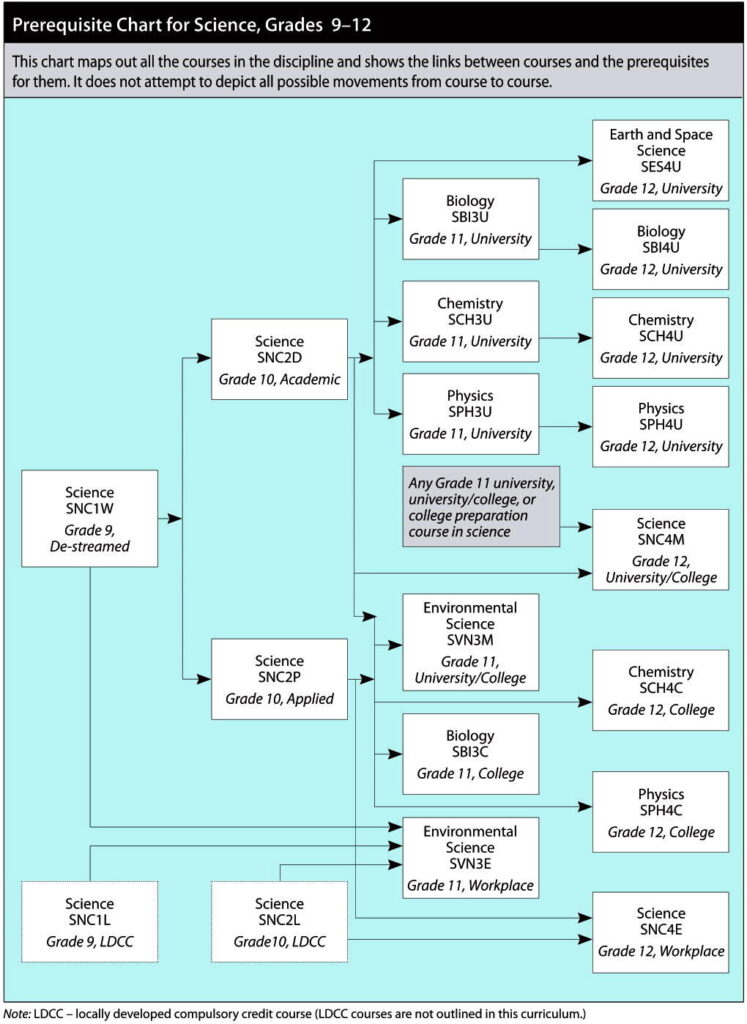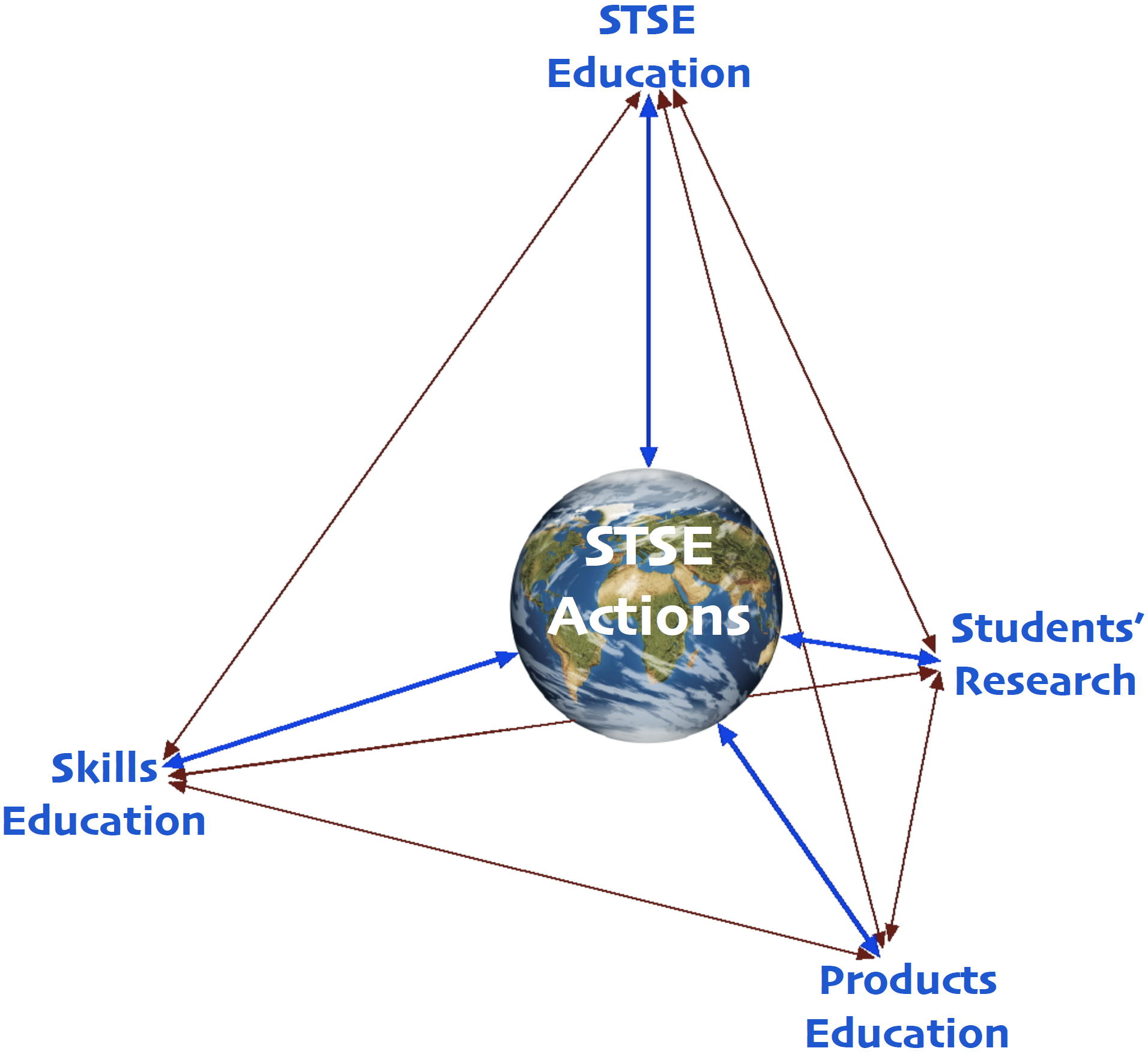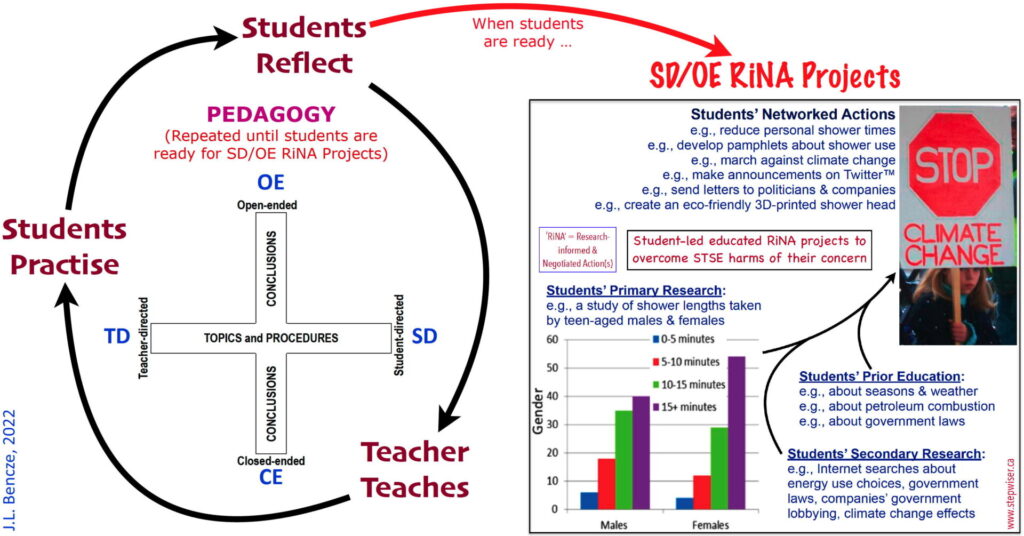Needs for Societal & Educational Reforms
Although it may not be apparent to or affect everyone, it seems quite clear that humanity is facing existential (e.g., climate crises, species losses) and ongoing (e.g., cancer, manipulative surveillance, job losses) crises linked to STEM fields. There is much research and argumentation to suggest that many or most of such problems are due to self-interested actions of few elite individuals (e.g., financiers) and groups (e.g., corporations) who, while acquiring ‘wealth’ (in different forms), cause numerous negative side-effects. To overcome such problems, therefore, I suggest that STEM education needs to be reformed – which, of course, can’t happen very extensively without more large-scale societal reforms. This web page – along with my Position Statement – elaborates on these claims.

We must strive for global altruism!
Our world is in crisis, with problems like climate breakdown, manipulative surveillance, illnesses like cancer and dramatic species losses. Many or most of such problems appear due to rampant egoism/self-interest. As George Monbiot suggests in the video at right/below, while most of us have strong altruistic tendencies, many or most of our leaders appear to lean (some more than others) towards psychopathy. Clearly, if we want a more ecojust world, we must spread altruism across networks (i.e., dispositifs) of living, nonliving & symbolic entities.
Rationale for Dispositif Reform
Myriad problems are linked to pro-capitalist dispositifs
Living and nonliving things are facing interwoven and unpredictable polycrises (and here) – including increasing inequality (also see Gini Index) & environmental destruction. Despite knowing about them, in some cases, for many years, many crises – like the climate emergency – are very persistent. Such resilience appears largely due to power of pro-capitalist dispositifs; that is, actor-networks of (a)biotic & symbolic actants – including corporations, transnational groups (e.g., WTO), free-market think tanks (e.g., Atlas Network), etc. – working like a machine to promote values like perpetual growth, individual possessiveness and cost externalizations.
Societies dominated by capitalism seem to have ‘cancer’
Many societies base social relations – to various extents – on capitalism; that is, with financial exchanges controlled by few individuals and/or groups. In neoliberal democracies (e.g., Canada), for example, there appears to be much ‘collusion’ between capitalists (e.g., corporations) and governments (and transnational groups) to set conditions to maximize private profit. In doing so, however, as George Monbiot (also see here) describes in the video at left/above, particularly because of cost externalities, much social and environmental damage results from increased private profiting. In that light, it is apparent to many that societies dominated by capitalism have ‘cancer’ and, put another way, are said to be psychopathic.
A major pro-capitalist technique is disaster capitalism; that is, as Naomi Klein describes in the video at right/below (and here), involves augmentation of pro-capitalist policies and practices (e.g., tax cuts for rich; business de-regulation; privatizations; public disinformation) while populations are distracted – and, moreover, disoriented – during and after ‘natural’ (e.g., earthquakes) or human-made (e.g., GFC) disasters. Disaster capitalism, has been and likely will continue to be used with every crisis – such as: Russia’s invasion of Ukraine; the CoViD-19 Pandemic; the Climate Emergency.
A movement somewhat related – perhaps paradoxically – to disaster capitalism appears to be ‘stakeholder’ capitalism; that is, capitalism that purports to serve stakeholders like workers, consumers, environments, etc. This movement often seems, however, to be a kind of ‘greenwashing’ of capitalist goals – which critics suggest continue to prioritize shareholder profits. As described in the video at left/above, for example, corporations that purport to prioritize social responsibility, environmentalism, etc. often sacrifice such goals in support of private profits. Indeed, profiteering through dodges like orientations towards EDI seem to align with notions of ‘progressive’ neoliberalism; i.e., further enacting neoliberalism by largely pretending to be ‘progressive.’
STEM fields appear captured by pro-capitalist dispositifs
As claimed by Dr. Sheldon Krimsky, fields of science & technology (or STEM) do not operate in isolation of other societal members (as depicted here); but, rather, often are heavily-influenced by funding sources and related facilitators (e.g., governments). As depicted at right/below, for example, ‘science’ (World –> Sign translations) often is compromised by, for example, having their findings ‘muzzled’ or their research de-funded. Meanwhile, fields of ‘technology’ (Sign –> World translations) often are biased in favour of profits through often-harmful technologies (e.g., petroleum-fueled energy systems). Very broadly, Ziman (2000) suggested that supposedly idealistic ‘norms’ of practices in the sciences often are compromised – like here. Also see: Science in the Private Interest; Impure Cultures; and, Science-Mart.
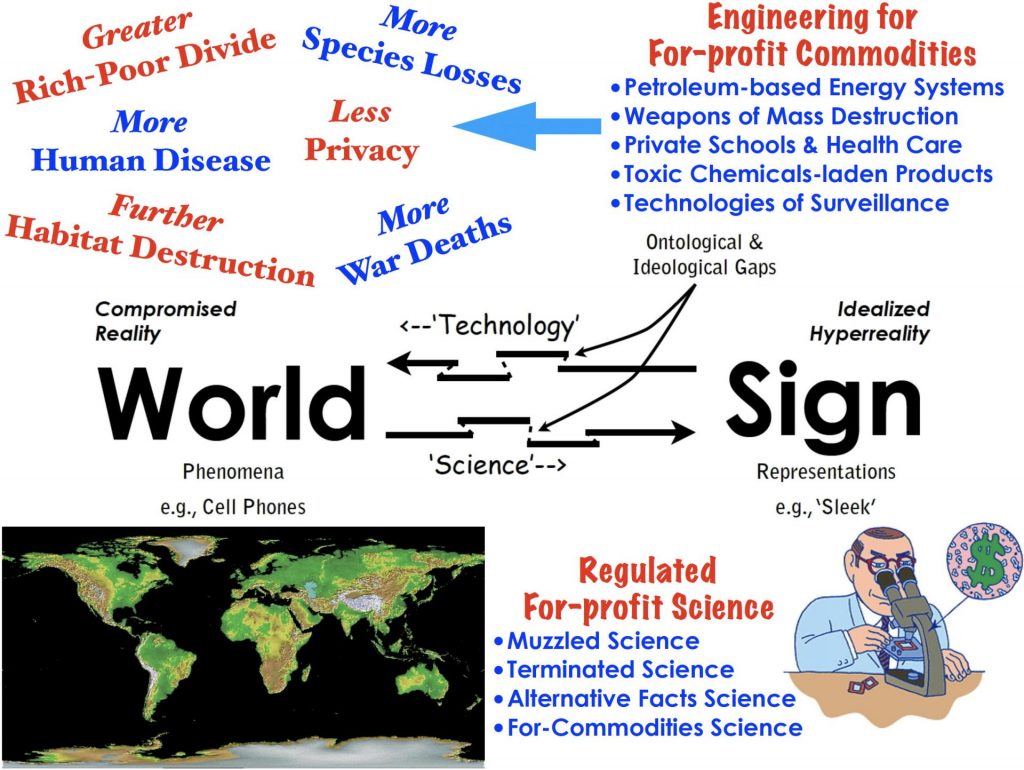
Pro-capitalist STEM fields contribute to devastating consumerism
With assistance from political leaders, financiers and corporations have – among several pro-profit tactics – oriented STEM fields towards promotion of societal consumerism and, perhaps, a related underlying ideology; that is, avarice. As elaborated in the video at left/above, in consumerist societies, citizens are conditioned to continuously accumulate goods, services and apparent status – which, in turn, appears to satisfy capitalists’ orientations towards continuous economic growth. Such consumerist and perpetual growth orientations are, in turn, associated with dramatic harms to wellbeing of individuals, societies & environments.
Analysts like Blades et al., Sharma and Hoeg & Bencze suggest that STEM education fields often – in synchrony with STEM fields – appear (as here) to support goals of pro-capitalist dispositifs, by supplying (broadly): i) expert STEM workers and ii) compliant workers & consumers.
Also see my video-based & short and/or long text-based summaries.
Also see Story of Stuff Project Site
Science & Technology Education as a ‘Selection & Training Camp‘ for Potential ‘Producers’
Science/STEM education systems often seem overly-focused on identifying & educating possible knowledge producers; e.g., STEM professionals. Selection often seems biased, based on certain narrow – explicit or implicit – pre-specifications.
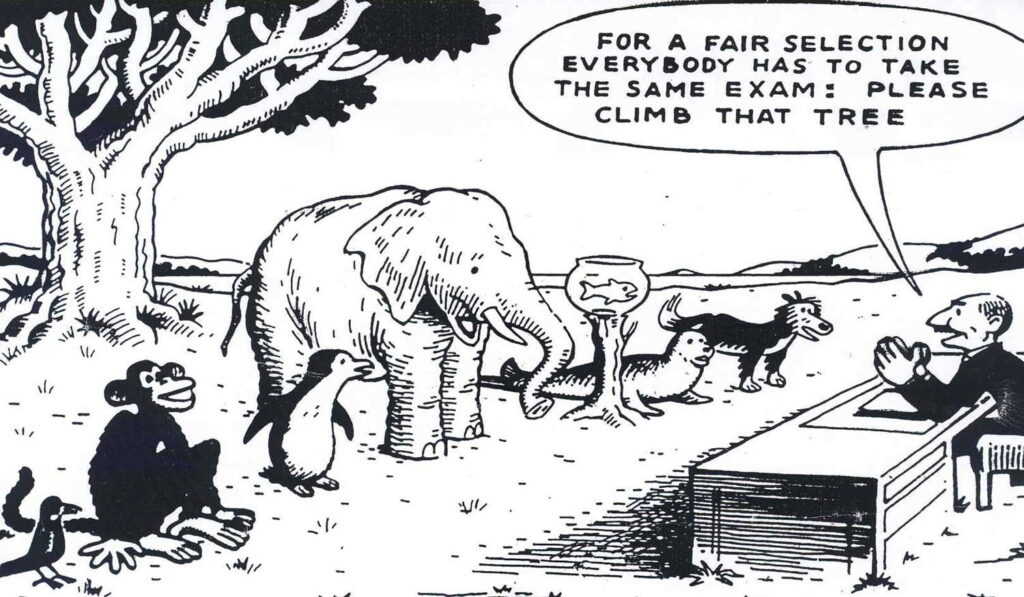

It is apparent – as illustrated at right/below – that science & technology (& STEM) education often is (and has been) like a ‘selection & training camp’ for sorting students into different work/life paths. Its priority is to identify & educate few potential knowledge ‘producers,’ such as: university-educated biologists, chemists & physicists, many of whom may choose careers in engineering, business administration and leadership, computer-based design, accountancy, etc., often serving interests of financiers, corporations, etc. more so than general social & environmental wellbeing. Among mechanisms for such sorting, it seems that science/STEM education is like a spectrometer – sorting students largely in terms of basic abilities (e.g., intelligence) and cultural & social (& other) capital (Bourdieu, 1986). In that sense, science/STEM education often is a ‘survival of the richest‘ (e.g., in intelligence, sociocultural capital, gender, race, sexuality, etc.) process. A key mechanism, as elaborated here, appears to be strong emphases on inquiry-based learning; i.e., expecting students to discover important & useful laws & theories and/or design solutions with minimal teacher supports.

Science & Technology Education as an ‘Apprenticeship for Consumership‘
For many students, science/STEM education often promotes consumerism like here (e.g., as compliant labourers & rabid purchasers) – through at least the mechanisms listed here and elaborated below:
- conformity via standardization;
- consumerism via saturation;
- confusion via intensification;
- reverence via idealization;
- dependence via regulation;
- disempowerment via individualization.
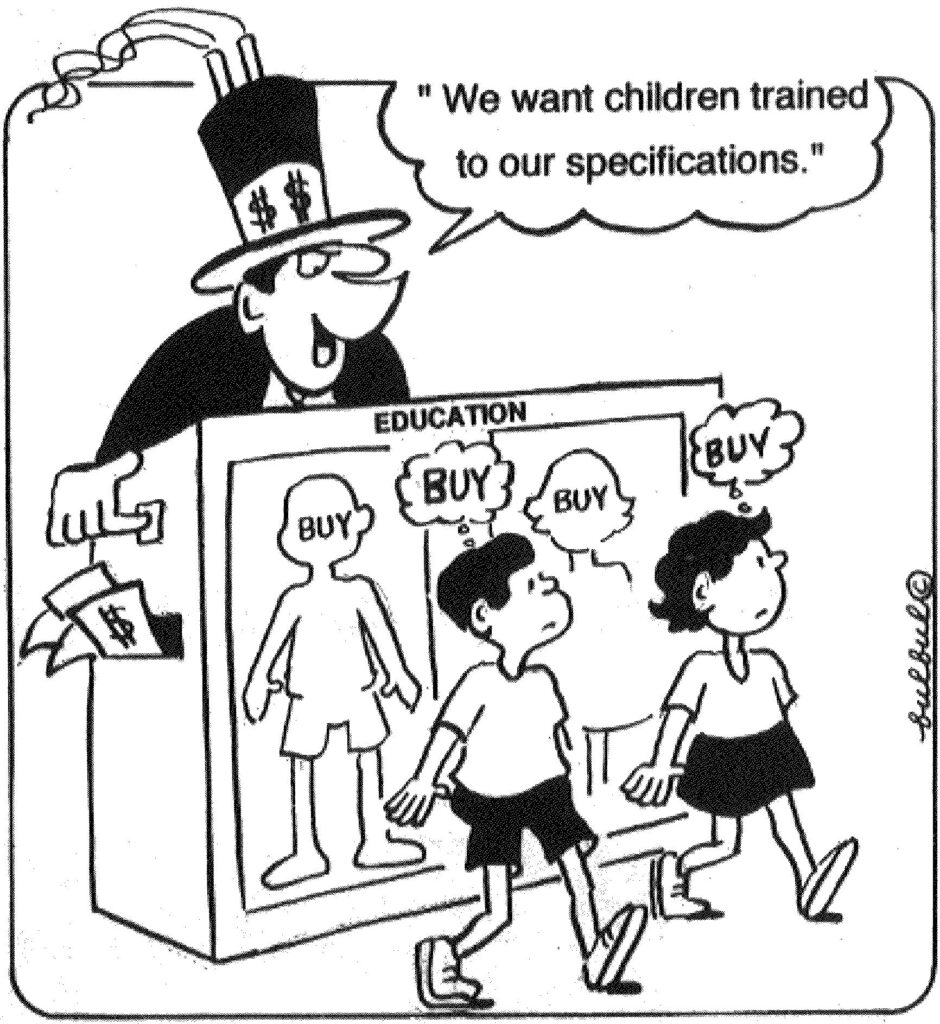
A mantra of many pro-capitalist science/STEM curricula is that they claim to guarantee that all students will receive the same educational opportunities, regardless of their situations. Although this may sound positive, it often appears as a set of ‘standards’ (or ‘Expectations’) for student outcomes – as if education is to be like a manufacturing line to generate products – like colas – with certain pre-specified characteristics. This can be problematic for many students, especially those whose socio-cultural capital does not align – like that of many Indigenous Peoples – with that of mainstream science/STEM education. Students wanting – tacitly or otherwise – to maintain their identities seem likely to be assimilated into dominant ideologies; ‘resistance is futile.’ Conformity is, nevertheless, often good for business. With school graduates increasingly alike, the general population may be more homogeneous and, therefore, more susceptible to mass marketing (Galbraith, 1958).
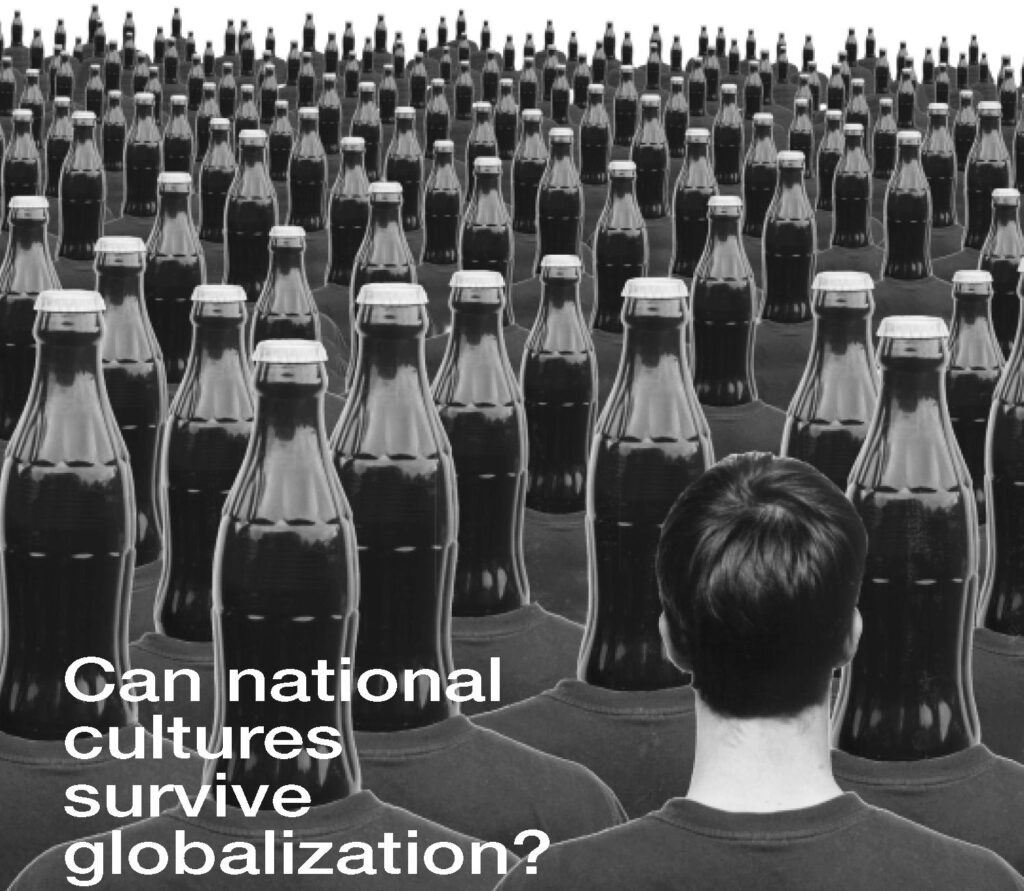
Being a student in science/STEM courses often can be like visiting a museum; i.e., it is assumed that your task is to learn about many products (e.g., laws & theories) and processes (e.g., experimentation & engineering design) that have been generated and/or used by experts. This can lead many students to assume that work of science, engineering, etc. is mostly completed – and that such work is best left to experts. Students can, in other words, become saturated with products & processes of science/STEM. Such saturation can lead to passivity, students’ feeling that their roles are to be consumers of knowledge (and commercial products & services), rather than producers of them. Even if students are engaged in inquiry-based learning, which is common, teacher guidance (or ‘scaffolding’) can create such passivity.
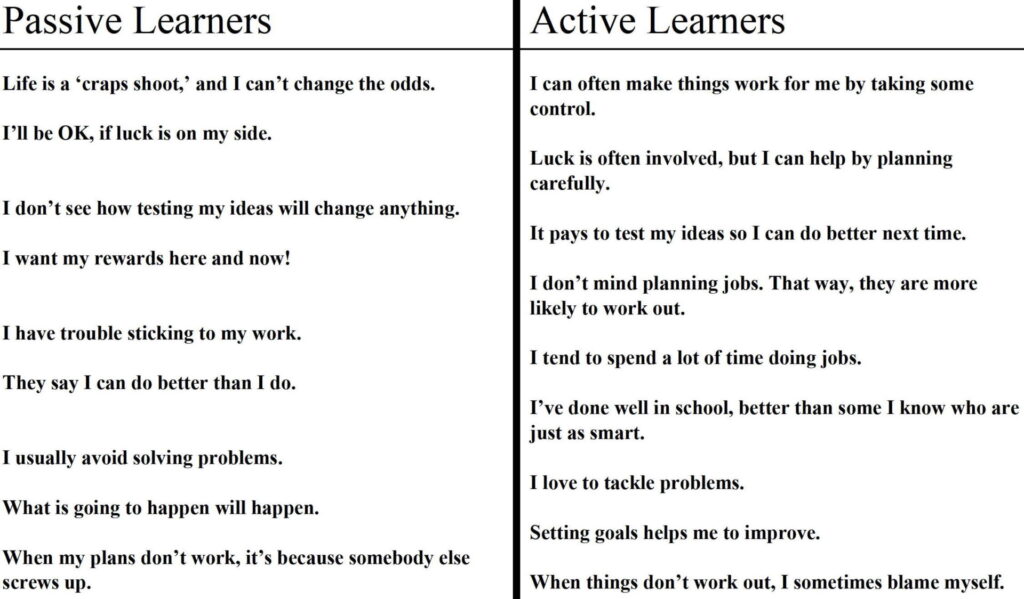
Adapted from Mary Budd Rowe, 1978
Being a student in school science/STEM often can be like trying to drink from a fire hose; large amounts of knowledge & skills are to be learned in short time periods – leaving many students confused. A science student in the UK, for example, described such experiences this way: “You just get to know what you’re talking about and [teachers] change [the topic] … you forget everything that you know … in the end you do not know what you are doing” (Claxton, 1991, p. 24). Millar (1996) claimed, for example, that most studies of students’ (by the age 16) understandings of fundamental laws and principles of science—including the particle theory of matter, the model of the solar system, and ideas about animal and plant gas exchange—are either simplistic or quite different from those of scientists. Similar results are obtained for lay adults. The confusion and rote learning that this sort of education engenders can seriously compromise students’ potential involvement in decision making on issues important to them and their abilities to create relevant knowledge.

School science/STEM often seems like a sophisticated ‘infomercial‘; i.e., selling products and practices of professional science/STEM fields by casting them in overly positive lights. Various myths about science products and practices frequently pervade school science, including that; i) observation provides direct and reliable access to secure knowledge, ii) science starts with observation, iii) science proceeds via induction, iv) experiments are decisive, v) science comprises discrete, generic processes, vi) science inquiry is a simple, algorithmic procedure, vii) science is a value-free activity, viii) science is an exclusively Western, post-Renaissance activity, ix) the so-called “scientific attitudes” are essential to effective practice of science, and x) scientists possess these attitudes (Hodson, 1999). Related to such views, science/STEM fields often are portrayed as closely adhering to Merton’s norms of ethical practice. Research suggests, however, that many fields of science/STEM are adversely influenced by funders’ profit motives (Ziman, 2000).

Students having excessive faith in the sciences/STEM fields may be much less intellectually independent and subject to manipulation by powerful others.
Often, even when students are said to be engaged in more student-directed, open-ended science inquiries or technology design projects, teachers may use different techniques to influence topic choices, research methods, data-processing approaches, conclusions and suggestions for uses of results. Students’ thoughts and actions can, in other words, be regulated to align with those useful to powerful people (e.g., financiers) and groups (e.g., corporations). Moreover, they may become intellectually dependent on such powerful people and groups for knowledge and technoscience products and services. Freire (2005 [1970]) suggested that such manipulative relationships represent forms of violence, in which powerful people & groups (e.g., companies influencing education) define ‘ideal’ thoughts, creativity & actions of most others.
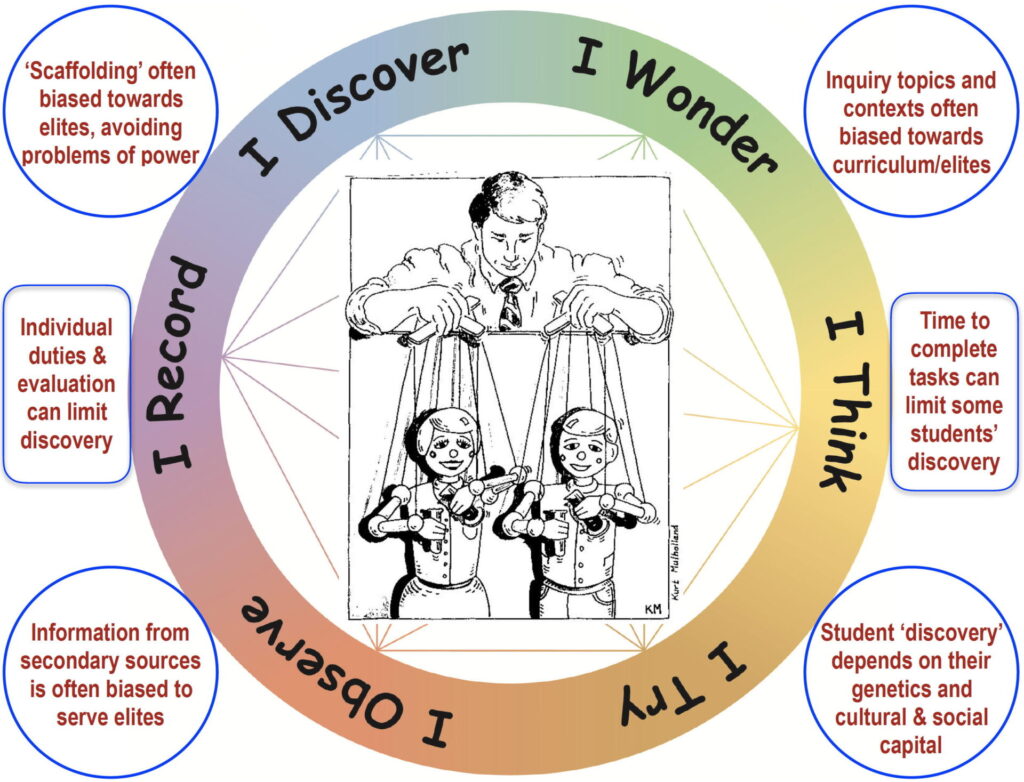
Although collaboration is said to enhance problem solving in many contexts, such as in business decisions and in school projects, student achievement in school science/STEM often is judged individually – through, for example, tests and examinations. Such competitive individualism appears, however, to be normalized in many societies – especially, it seems, in those governed by neoliberalism, an ideology organizing most living and nonliving things to support private profit generation, often regardless of costs to wellbeing of most living and nonliving things.

Educators must enlighten & empower students to actively help increase social justice & environmental vitality
Mechanisms (e.g., disaster capitalism) and harms (e.g., climate breakdown) likely largely-attributable to pro-capitalist dispositifs appear very resistant to change – such as when large corporations were ‘bailed-out’ after the 2007/08 global financial crisis. As Antonio Gramsci pointed out (Prison Notebooks, 1929-35), although ‘public consent’ in authoritarian states (e.g., China, N. Korea, etc.) is not essential (e.g., via military controls), elite in ‘democracies’ must – often with neoliberal assistance from governments & transnational groups (e.g., WTO) – ensure public compliance through cultural hegemony, often through subtle means like media and education controls. Accordingly, as suggested in the video at left/above, educators must give students insights into often-hidden meanings of everyday phenomena – including apparent hegemonic roles of pro-capitalist dispositifs – and prepare them to take personal &/or social actions (like young climate activists) to help overcome harms of their concern.
Acting to improve world conditions also can benefit actors
Acting to improve wellbeing of other living and nonliving things can seem very altruistic – a process of giving away some of your self; e.g., your time & money. People might be altruistic for different reasons, including religious/ethical ones – feeling such acts are their responsibility. Others might reason, though, that acting for the world around them may benefit them – since, as described in the video at right/below, improving the world may benefit everyone. Acting for others also can make us feel good. At any rate, many harms appear so severe and resistant to change that personal &/or sociopolitical actions seem necessary.
Educators need to encourage development of dispositifs prioritizing altruism general wellbeing
Although public education to overcome cultural hegemony may be helpful, due to resilience of pro-capitalist dispositifs, we must – as George Monbiot suggests in the video at left/above and here – take actions to replace our current dispositifs that prioritize “psychopathic” values like individual possessiveness, competitiveness and cost externalizations, with those prioritizing altruism and general wellbeing, perhaps embodied in ecojustice education movements.
Alternatives to Pro-capitalist Science & Technology (STEM) Education
Socioeconomic systems like those influenced by neoliberalism and authoritarianism are very resistant to change, as with capitalist advancements during the CoViD-19 pandemic. Their resilience appears due to abilities of elite to orchestrate most living & nonliving things into complex and vast cooperative networks (‘dispositifs‘). Those (e.g., here) wanting societies oriented, instead, to ideologies like ecojustice (attacking ideologies like these) must, therefore, promote development of new, widely-accepted, dispositifs. That will not likely be easy. However, given that technoscience developments appear to co-affect societal zeitgeists (Jasanoff), technoscience education must be considered a main route to dramatic socioeconomic change.
STEPWISE Theoretical Schema
Partly driven by frustrations promoting student-directed & open-ended science inquiry &/or technology design projects (likely due to neoliberal influences on education), in 2006, I developed the STEPWISE schema below. Forming a tetrahedron, it co-relates five domains – adapted from Ontario curricula – while prioritizing STSE Actions as forms of altruism. Text in the graphic below link to suggestions about each domain.
STEPWISE Pedagogical Schema
Teachers found the tetrahedral STEPWISE framework (at left/above) too complex (e.g., implying simultaneous education about all five learning domains in the tetrahedron) and, so, I developed (in 2007) – working with a teacher – an earlier version (e.g., here) of the pedagogical schema shown below. It is meant to oppose capitalist influences and, instead, promote societal shifts towards more ecojustice (e.g., vs. these values). As shown below, it aims to provide students with one or more sets of 3-phase, constructivism-informed, lessons & student activities to help prepare them to independently (SD/OE) develop & implement research-informed & socially-negotiated sociopolitical actions (RiNAs) to overcome harms they perceive in STSE relationships. Linked to the graphic below are values inherent to STEPWISE.
STEPWISE Balancing of Direct Instruction vs. Student Choice
STEPWISE frameworks are informed by numerous theoretical perspectives. A major influence is constructivist learning theory. As elaborated here, it assumes that each person ‘constructs’ relatively unique attitudes, skills & knowledge (ASK) from their experiences. For example, different people ‘see’ different images (e.g., side of a cow or map formations) when viewing the black-and-white image at right (below). This suggests that our responses to sense experiences tells us more about ASK already in our brains (and bodies) than information in the experiences. Among implications for teaching & learning, we suggest it implies that educators should – based on the STEPWISE pedagogy – encourage students to express ASK they already hold, directly teach them ASK that may be unfamiliar to them and allow them, to a great extent, to construct new ASK to further self-determine their thoughts and actions.

Apparently, learners can only ‘construct’ new ASK if they possess (e.g., in their minds & bodies) ‘resources’ – such as new knowledge (e.g., about natural selection) that has been directly taught to them because they might struggle to construct them on their own. Because of such limits on constructions, the STEPWISE pedagogical schema prioritizes different choices in terms of Lock’s (1990) control-of-learning framework at right/below. Choices made in this regard prioritize democratic principles, like: direct teaching (TD/CE) about a plurality of perspectives and practices and opportunities for personal choices (SD/OE) – both of which seem compromised in many societies. Under influences of neoliberalism, for example, governments have cooperated with many supportive entities, including transnational ones like the WTO, to prioritize values like competitive possessive individualism. In this paradigm, competitions appear unfair. For example, emphases on student self-discovery in inquiry-based learning approaches seem discriminatory and STEM education omissions or sanitization of harms that appear largely due to neoliberalism can compromise many students’ democratic rights.
By using teacher-directed, closed-ended approaches in synchrony with more student-directed & open-ended application activities – about apparently problematic neoliberal influences on STEM (and related) fields and much more and sample RiNA projects, it is my hope that students may develop and implement sociopolitical actions that may disrupt and perhaps dramatically transform societies of control (see video here) in ways promoting greater ecojustice. Drawing on concepts in A Thousand Plateaus, we may imagine students acting to promote replacement of hierarchical societies with those more like rhizomes; e.g., in eclectic ways. To help with this, as recommended Che Guevara, Paulo Freire, and the Pedagogy of Revolution, democratic educators must combine direct critical instruction with students’ independent opportunities for reflective practice (praxis) – which is reflected in STEPWISE emphases on Student-led RiNA Projects.
Needs to mobilize/spread ecojustice values, practices, etc.
The STEPWISE educational programme has had some successes, although it tends to be limited to contexts in which a supportive ‘mini-dispositif’ exists – like, as shown here, cooperation among: government curriculum (e.g., including STSE Education), development of relevant teaching materials (e.g., via collaborative action research) and teachers’ more Naturalist-Antirealist NoS views. Due to relative scarcity of such supportive ‘mini-dispositifs,’ it is apparent that educators and others must work to develop more of them and, moreover, to expand pro-ecojustice dispositifs – through, for example, engaging diverse actants like governments, transnational organizations, worker unions, technoscientists, etc. In doing so, like Kuhn’s idea of paradigm change, new organizing theories, schema, etc. must be seen as adequately fitting existing and new phenomena – such as Kate Raworth’s ‘Donut’ economics described at right/below.
Also see: Circular Economics.
